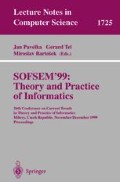Abstract
Changeability (also called evolvability) is an essential property of software. Software change is the foundation for both new software development and legacy software maintenance, therefore a better understanding of software change is an important software engineering issue. This paper covers selected topics related to software change, including minicycle of change, partitioned annotations, and change propagation, and gives a brief overview of the field.
This work was partially supported by a grant from Ford Motor Co. and NSF grant CCR-9803876.
Access this chapter
Tax calculation will be finalised at checkout
Purchases are for personal use only
Preview
Unable to display preview. Download preview PDF.
References
T. J. Biggerstaff, B. G. Mitbander, D. E. Webster, Program Understanding and the Concept Assignment Problem, Comunications of ACM, May 1994, 72–78. 199
S. A. Bohner, R. S. Arnold, ed., Software Change Impact Analysis,IEEE Computer Soc. Press, Los Alamitos, CA, 1996.
F. Brooks, No Silver Bullet, IEEE Computer, April 1987, 10–19. 189
R. Brooks, Towards a Theory of the Cognitive Processes in Computer Programming, Int. J. Man-Machine Studies, Vol. 9, 1977, 737–751.
Y. F. Chen, M. Y. Nishimoto, C. V. Ramamoorthy, The C Information Abstractor System IEEE Transactions on Software Engineering Vol. 16, 1990, 325–334.
M. A. Cusumano, R. W. Selby, How Microsoft Builds Software, Communications of ACM, June 1997, 53–61.
R. K. Fjeldstad, W. T. Hamlen, Application Program Maintenance Study: Report to Our Respondents, in G. Parikh, N. Zvegintzov, eds., Tutorial on Software Maintenance, IEEE Computer Society Press, Los Alamitos, CA, 1982, 13–30.
E. Gamma, R. Helm, R. Johnson, J. Vlissides, Design Patterns, Addison Wesley, Reading, MA, 1995.
C. Jones, The Year 2000 Software Problem, Addison Wesley, Reading, MA.,1998.
A. Lakhotia, Understanding Someone Else’s Code: An Analysis of Experience, J. Systems and Software, 1993, 269–275.
D. Le Metayer, Describing Software Architecture Styles Using Graph Grammars, IEEE Trans. On Software Engineering, 1998, 521–533.
D.L. Parnas, On the criteria to be used in decomposing systems into modules, Communications of the ACM, Dec. 1972, 1053–1058.
Proceedings of the 7th IEEE International Workshop on Program Comprehension, IEEE Computer Society Press, Los Alamitos, CA, 1999.
V. Rajlich, Theory of Data Structures by Relational and Graph Grammars,In Automata, Languages, and Programming, Lecture Notes in Computer Science 52, Springer Verlag,1977,391–511.
V. Rajlich, N. Damaskinos, P. Linos, W. Khorshid, VIFOR: A Tool for Software Maintenance, Software-Practice and Experience, Vol. 20, No. 1, Jan.1990,67–77.
V. Rajlich, S. R. Adnapally, VIFOR 2: A Tool for Browsing and Documentation, Proc. IEEE International Conference on Software Maintenance, IEEE Computer Society Press, Los Alamitos, CA, 1996, 296–299.
V. Rajlich, A Model of Change Propagation based on Graph Rewriting, Proc. Of IEEE International Conf. On Software Maintenace, IEEE Computer Society Press, Los Alamitos, CA, 1997, 84–91.
V. Rajlich, S. Ragunathan, A Case Study of Evolution in Object Oriented and Heterogenous Architectures, The Journal of Systems and Software 43, 85–91, 1998.
V. Rajlich, S. Varadajan, Using the Web for Software Annotations, International Journal of Software Engineering and Knowledge Engineering 9, 1999, 55–72.
V. Rajlich, Modeling Software Evolution by Evolving Interoperation Graphs, to be published in Annals of Software Engineering, Vol.9, 2000.
W. Tichy, Configuration Management, John Wiley and Sons, N.Y., 1994.
A. von Mayrhauser, A. Vans, Comprehension Processes During Large Scale Maintenance, Proc. 16th Int. Conf. on Software Engineering, IEEE Computer Society Press, Los Alamitos, CA, May,1994,39–48.
N. Wilde, R. Huitt, Maintenace Support for Object-Oriented Programs, Proc. Conf.on Software Maintenance,IEEE Computer Society Press, Los Alamitos, CA, 1991, 162–170.
S. S. Yau, J. S. Collofello, T. MacGregor, Ripple Effect Analysis of Software Maintenance, Proc. Compsac, IEEE Computer Society Press, IEEE Computer Society Press, Los Alamitos,CA, 1978,60–65.
Author information
Authors and Affiliations
Editor information
Editors and Affiliations
Rights and permissions
Copyright information
© 1999 Springer-Verlag Berlin Heidelberg
About this paper
Cite this paper
Rajlich, V. (1999). Software Change and Evolution. In: Pavelka, J., Tel, G., Bartošek, M. (eds) SOFSEM’99: Theory and Practice of Informatics. SOFSEM 1999. Lecture Notes in Computer Science, vol 1725. Springer, Berlin, Heidelberg. https://doi.org/10.1007/3-540-47849-3_12
Download citation
DOI: https://doi.org/10.1007/3-540-47849-3_12
Published:
Publisher Name: Springer, Berlin, Heidelberg
Print ISBN: 978-3-540-66694-3
Online ISBN: 978-3-540-47849-2
eBook Packages: Springer Book Archive

